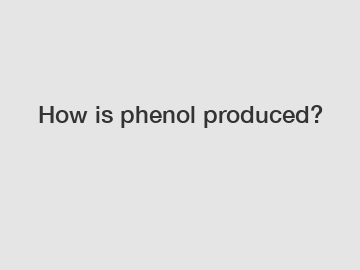How is phenol produced?
Phenol, also known as carbolic acid, is a chemical compound that plays a significant role in various industries, ranging from pharmaceuticals to plastics. It is a versatile compound with numerous applications, making it a valuable commodity in the market. But have you ever wondered how phenol is produced?
The production of phenol involves a complex chemical process that requires both skill and precision. Phenol is typically produced from benzene, a hydrocarbon compound derived from petroleum. The process involves a series of steps that transform benzene into phenol through a process known as cumene hydroperoxide (CHP) process.
The first step in the production of phenol is the oxidation of cumene (isopropylbenzene) to cumene hydroperoxide (CHP) using oxygen as an oxidizer. This reaction is carried out in the presence of a catalyst, typically a solid acid catalyst such as aluminum silicate. The oxidation of cumene is an exothermic reaction, meaning that it releases heat as it progresses.

Once cumene hydroperoxide is formed, it is then cleaved into phenol and acetone through a process known as cleavage. This step is carried out by subjecting the cumene hydroperoxide to high temperatures and pressure, typically around 110-115 degrees Celsius and 6-8 atmospheres. The cleavage of cumene hydroperoxide produces phenol and acetone in a 2:1 ratio.
The phenol produced through this process is then purified through various distillation steps to remove any impurities and by-products. The final product is a high-purity phenol that is ready for use in various applications.
The production of phenol is a high-stakes process that requires careful monitoring and control to ensure the quality and purity of the final product. Any deviations in the process parameters can lead to lower yields, reduced quality, or even safety hazards. This is why phenol production facilities are equipped with state-of-the-art monitoring and control systems to ensure the process runs smoothly and efficiently.
The demand for phenol continues to grow as industries such as pharmaceuticals, plastics, and agriculture rely on this versatile compound for their production processes. As such, the production of phenol plays a crucial role in meeting the needs of these industries and driving economic growth.
In conclusion, the production of phenol is a complex and intricate process that requires a deep understanding of chemistry and chemical engineering. By following a series of steps that transform benzene into phenol through the cumene hydroperoxide process, manufacturers are able to produce high-quality phenol that meets the demands of various industries. With the right expertise and technology, the production of phenol continues to be a critical component of the chemical industry, driving innovation and economic growth.
For more information, please visit Technical Naphthalene Manufacturer, China wholesale chemical company, Aluminium Ingot Manufacturer.
220
0
0

Comments
All Comments (0)